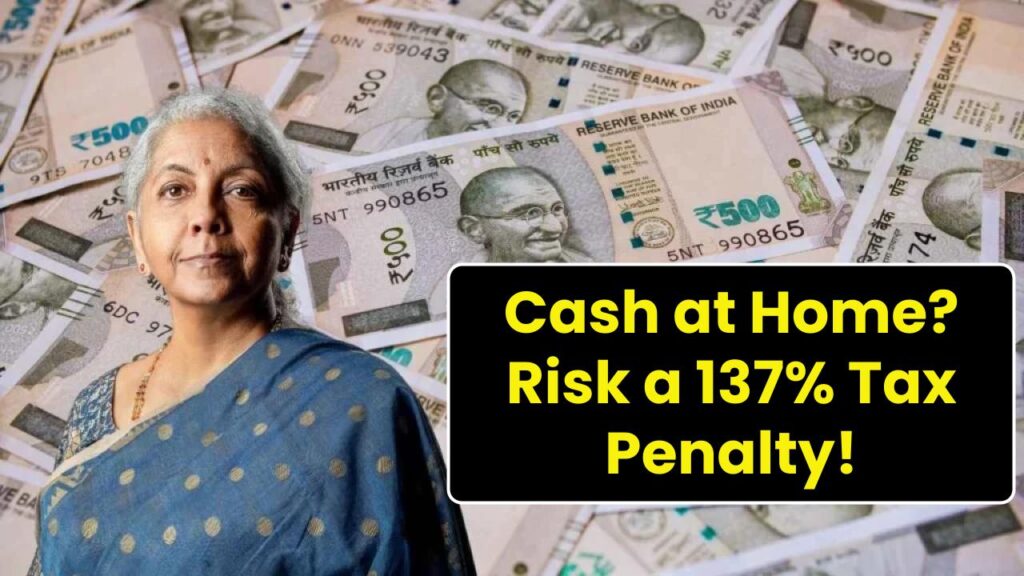
Keeping large amounts of cash at home might seem convenient, but did you know it could lead to severe income tax penalties? In India, if you cannot explain the source of your cash holdings, you could face penalties as high as 137% of the undisclosed amount. This article breaks down the legal limits, risks, and best practices to keep your money safe and tax-compliant.
Cash Limit: Keeping Cash at Home?
| Topic | Key Information |
|---|---|
| Legal Cash Limit | No fixed limit, but must be accounted for |
| Penalty for Unexplained Cash | Up to 137% of unaccounted amount |
| Cash Transaction Limits | ₹2 lakh per person per day; ₹20,000 for loans/deposits |
| Official Sources | Income Tax Department |
Keeping large amounts of unexplained cash at home can lead to serious financial penalties and security risks. To stay compliant, ensure all cash transactions are properly documented, and consider using banking channels, investments, or digital transactions instead. If you have large sums of money, keep records to avoid scrutiny from tax authorities.
Why Keeping Large Amounts of Cash at Home Is Risky
While there are no specific laws restricting how much cash you can keep at home, authorities scrutinize unaccounted cash. If the Income Tax Department finds cash that isn’t supported by legitimate earnings, it may be classified as undisclosed income, leading to harsh penalties.
Tax Penalties on Unaccounted Cash
The Indian Income Tax Act considers unaccounted cash as black money if it lacks proper documentation. The penalties include:
- Tax Rate on Unaccounted Income: 60%
- Surcharge: 25% of tax amount
- Cess: 4% on total tax
- Total Penalty: Up to 137% of the undisclosed cash
For example, if an individual is found with ₹10 lakh in unexplained cash, they could end up paying ₹13.7 lakh in taxes and penalties.
Legal Cash Limits and Transaction Restrictions
1. Maximum Cash You Can Keep at Home
Although there is no legal cap on cash holdings, it must align with declared income and withdrawals.
2. Cash Transaction Limits to Avoid Penalties
- Receiving ₹2 lakh or more in cash from a single person per day is prohibited.
- Loan or deposit transactions exceeding ₹20,000 in cash are not allowed.
- Cash donations exceeding ₹2,000 are not tax-deductible.
- Property transactions in cash above ₹20,000 attract penalties.
These restrictions help curb black money and tax evasion.
RBI FD Rules: Big Boost for Fixed Deposit Holders, Check RBI New FD Guidelines
Bank Holidays: Will banks be closed on February 17? Check the full list
New FASTag rules from Monday: 60 Minutes Can Decide Your Toll Charges! Learn how it affects you
Additional Risks of Keeping Excess Cash at Home
Beyond tax penalties, keeping large sums of cash at home presents security risks such as:
- Theft and burglary: Cash at home is vulnerable to theft.
- Natural disasters: Fires, floods, or earthquakes can destroy cash.
- Devaluation risks: In the event of demonetization or economic instability, large cash holdings may lose value.
Best Practices for Managing Cash at Home
1. Maintain Proper Documentation
Ensure that you have:
- Bank withdrawal slips
- Salary receipts
- Business cash transaction records
2. Deposit Large Cash Holdings in a Bank
Depositing money in a bank provides:
- Safety from theft or loss
- Interest earnings
- Legitimate transaction history
3. Use Digital Transactions
Instead of cash, consider UPI, bank transfers, or credit/debit cards to keep track of your transactions.
4. Utilize Financial Instruments
If you have excess cash, consider fixed deposits, mutual funds, or government bonds for better returns and security.
FAQs On Cash Limit
1. What is the maximum cash one can legally keep at home in India?
There is no fixed limit, but large sums should match declared income and expenses.
2. Can I be penalized for depositing too much cash in my bank account?
Yes, if your deposits exceed ₹10 lakh in savings accounts or ₹50 lakh in current accounts, they may be flagged by the IT Department.
3. How can I prove the source of my cash?
Maintain bank statements, income records, and receipts to justify your cash holdings.
4. What happens if I receive a cash gift above ₹2 lakh?
You will be taxed unless the gift is from a close relative (spouse, parents, siblings, etc.).
5. What is the penalty for keeping unaccounted cash at home?
You may be charged up to 137% in tax penalties if you cannot prove the source.
6. How can I safely store cash at home?
If you must keep cash, store it in a secure home safe, away from common areas, and ensure only trusted family members know about it.
7. Are there tax benefits for digital transactions?
Yes, digital transactions provide transparency and can help claim deductions on business expenses and avoid penalties.







